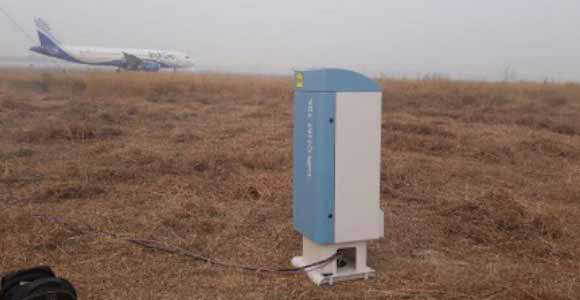-
English (US)
Choose your OTT HydroMet brand and region:

Leading organizations rely on OTT HydroMet for accurate and reliable weather data supporting fundamental monitoring and scientific research.
Sustainability is an often-used word, but building environmental monitoring networks is complicated and expensive. Therefore, it is important to consider sustainability in the form of the service life of the system when planning measurement networks. Since this typically should last longer than 10 years, the system must allow permanent modernization and improvements.
OTT HydroMet meteorological technologies offer long-term stability, extreme ruggedness, precision and reliability even under extreme conditions.
Travel around the world with OTT HydroMet's Lufft brand and discover worldwide applications. Learn more about the meteorological markets and our weather sensors. Immerse into the history of meteorology and get a closer look at a project in the Philippines.

Lufft ceilometers used in large meteo networks of DWD & KNMI
In 2015, two big tenders were won by Lufft – one from the “KNMI” (Dutch Royal Weather Service), and the other one from the biggest German Weather Service “DWD” (“Deutscher Wetterdienst”). Both of them were looking for a cloud height sensor capable of measurements up to 12 kilometers into the sky.

Several Lufft CHM 15k ceilometer projects in India
The Indian Institute of Tropical Meteorology has deployed Lufft CHM 15k ceilometers for several research studies.

Hydro-Met Station with WTB100 and WS501 in Malaysia
Learn about the success story of our Malaysian sales partner from TCK e-solutions, Sdn Bhd, installing a hydro-met station for the Department of Irrigation and Drainage Malaysia.

OTT Pluvio² L in use for a research project in Antarctica
Close to McMurdo Station in Antarctica, researchers from the University of Colorado, Boulder and the National Center for Atmospheric Research are investigating methods to measure the accumulating snowfall in the harsh Antarctic environment. These measurements are important to better understand the potential for sea level rise in the future due to climate change.

Lufft Snow Height Sensor SHM30 at ICIMOD-Station in Yala Glacier, Nepal
Three of twelve meteo stations in Langtang Valley, Himalayas, and Nepal are equipped with Lufft SHM30 snow depth sensors. The solar-powered measurement sites deliver information for glaciological, meteorological, and hydrological fieldwork.

Ceilometer Network "ALICEnet"
ALICEnet is a network of monitoring stations operated by Italian research institutions and environmental authorities with the mission of improving the multidisciplinary use of environmental data.